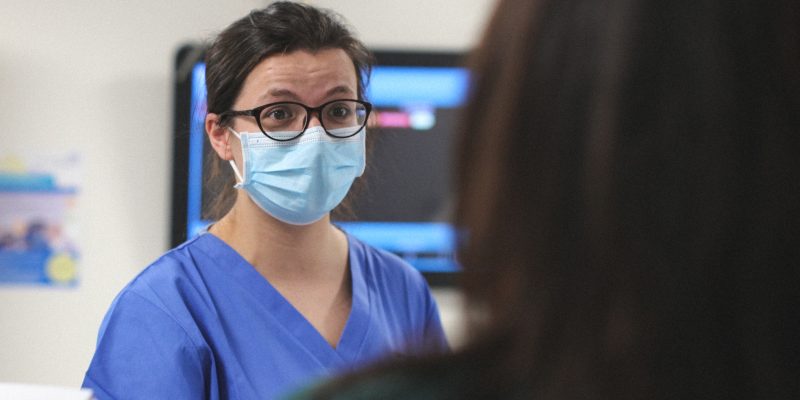Our partnership programme offers a whole new way to help people who are homeless. We train NHS staff to help patients access the accommodation, care and support they need to recover, and get life onto a better pathway after their stay in hospital.
Pathway teams are led by specialist GPs who bring their experience caring for homeless people in the community, as well as expertise in methadone prescribing, personality disorder, and chronic disease management. Nursing staff manage the team caseload and bring vital clinical experience in homelessness, addictions and/or mental health.
Housing specialists bring their expertise to the service and help build links with voluntary sector services in the community. Some Pathway teams also include Care Navigators who have personal experience of homelessness, and larger teams also include occupational therapists, social workers and mental health practitioners.
Teams work with patients to create bespoke care plans for their support, including referrals to addiction services, ongoing treatment for health issues such as hepatitis C and tuberculosis, and community services offering social care. Coordinating input from housing departments, mental health and addictions services, social services, community and charity sector partners, Pathway teams provide empathetic, patient-centred, recovery-focused care.
You can read the latest Annual Report of the programme below.
Breaking The Cycle: Improving Hospital Care and Discharge for Patients Experiencing Homelessness – The Pathway Partnership Programme Annual Report 2022-23
Based in the hospital, Pathway teams:
- provide expert advice and clinical advocacy around homeless and inclusion health issues (such as substance misuse and substitute prescribing) for inpatients, improving care and treatment outcomes
- ensure patients with complex needs are able to engage with health and other services through holistic inpatient support and care, thereby reducing rates of early self-discharge
- help homeless patients find somewhere safe and appropriate to stay on discharge, taking into account their needs around health, care and general support
- support patients with financial issues, welfare entitlement and access to specialist legal help where possible
- help to replace lost ID documents
- ensure patients are registered with a GP for ongoing care
- refer and signpost to specialist community services to help with a variety of social, mental and physical health, and addictions issues
- reconnect patients to family and social support networks on discharge
Our teams do this by coordinating and hosting regular multidisciplinary team meetings, attended by key professionals within the hospital and also external community services. They also carry out ward rounds as a team to review the care of all homeless patients within the hospital.
Pathway’s experience has shown that multidisciplinary teams are most effective in addressing the multiple health issues homeless people face. National evaluations have shown that integrating housing and clinical staff into the team led to ‘better outcomes and more positive working practice’ and recommends this as one of the key ‘components of effective models for future replication.’
Pathway teams have been shown to be cost-effective. In today’s NHS, the drive for financial savings seems to compete for priority with improving patient care. Pathway promotes medically evidenced models of care with compassion at their heart. However, a randomised controlled trial showed that a Pathway team is cost effective, and improves people’s health and housing status, confirming that a little bit of help puts life on a better pathway.
Pathway Partnership teams deliver improved outcomes for patients experiencing homelessness:
- better health 90 days after discharge
- over 50% reduction in rough sleeping on discharge
- nearly three times the number of patients in temporary accommodation on discharge
- assisted over half of patients with inappropriate GPs to register with new GPs
Our teams can triple the number of patients entering temporary accommodation on discharge
| 1-30 homeless patients each year need… | 30-200 homeless patients each year need… | 200+ homeless patients each year need… | |
|---|---|---|---|
| An identified, responsible member of staff | X | X | X |
| A referral protocol to the local authority, ensuring that all staff are aware of their duty under the Homelessness Reduction Act | X | X | X |
| An information pack with signposting to local hostels, food banks, housing department details | X | X | X |
| A small supply of spare, warm, clean clothing | X | X | X |
| A dedicated housing worker | X | X | X |
| A named link hospital coordinator to maintain the referral protocol and support the housing worker in obtaining necessary medical assessments (with patient’s consent) | X | X | |
| Strong relationships with the local council housing department, hostels and charities | X | X | |
| Training and education of all hospital staff by the housing officer and named hospital coordinator | X | X | |
| A full Pathway team including GP, nursing staff and care navigators | X | ||
| A coordinator if the service spans multiple sites | X | ||
| Any specialist staff identified in the needs assessment | X |
Pathway’s mission is to improve the experience and health outcomes of people who are homeless in hospital. We work closely and collaboratively with local delivery partners to support them to do this in their hospital. Alongside our social partnership online manual, our support package includes direct access to a central Support Team and the benefits of belonging to our network. We also share best practice, develop resources, arrange peer visits and organise network events.
All elements of Pathway’s Partnership Programme, from the initial enquiry process to team set-up and development, are covered in the partnership operations manual. This online manual is a central part of the support package that we provide to all teams in our partnership programme.
